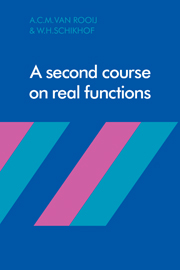Preface
Published online by Cambridge University Press: 06 January 2010
Summary
This book is devoted to the study of real functions of a single variable and is meant to present a survey of the topic, touching the most important notions. It is intended for advanced undergraduate students or anyone on a higher level who wants to deepen his or her knowledge obtained from elementary analysis courses.
It has become standard to treat real analysis with an eye to the modern theories of general topology, measure theory and functional analysis. This is, of course, a perfectly valid view. Hewitt & Stromberg's Real and Abstract Analysis (1965) is an excellent example of a book originating from this philosophy.
But real analysis is also an enthralling subject in its own right. Until about 1930 the theory was developed by people who were interested in the structure of the real line itself. The resulting abstractions were considered, in the first instance, to be merely by-products, whereas now they have grown very important. In this light it is not surprising that parts of the classical theory that did not admit interesting generalizations have virtually disappeared from the scene (e.g. monotonicity, Darboux continuity, derivative functions). Nevertheless, anyone who pays some attention to them will see that they can be fascinating.
In our book we follow the founding fathers by choosing the direct approach. We have at our disposal the real number system with its rich structure. Let us use all of that and try to obtain a deeper insight into the properties of ℝ, its subsets and the functions defined on them, and let us not go further into abstractions and generalizations than is necessary for our immediate purpose.
- Type
- Chapter
- Information
- A Second Course on Real Functions , pp. vii - ixPublisher: Cambridge University PressPrint publication year: 1982



